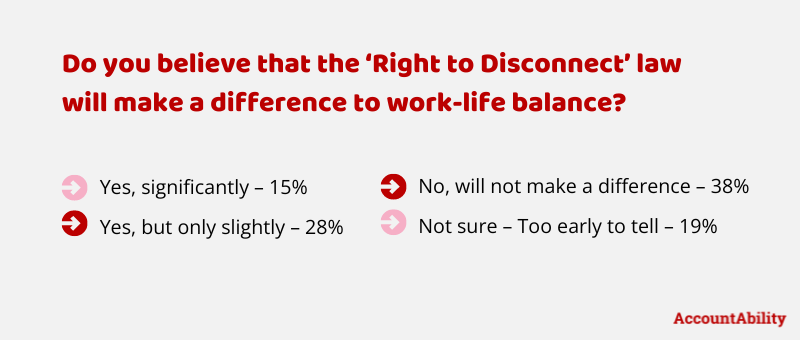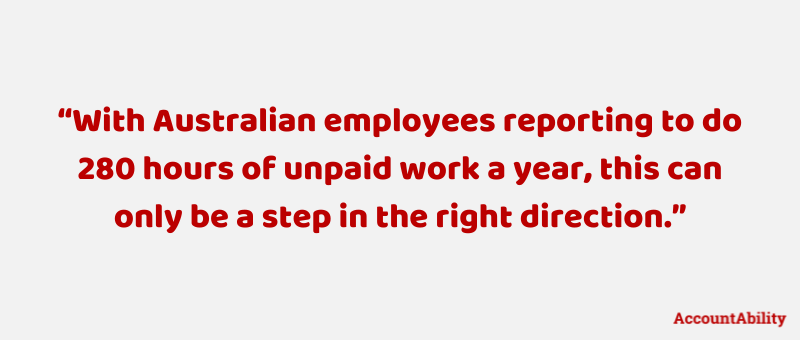Recently Australia passed a new law offering employees the right to disconnect after their working hours. This came about in an effort to help ease the mental load that has significantly increased since Covid and the rise of remote work.
The statistics speak for themselves with Australian Institute and Centre for Future of Work reporting employees are doing an average of 5.4 hours of unpaid work a week. This equates to over 280 hours a year of unpaid work!
I have been speaking with our clients and getting a varied response on this new law and how it might impact their organisation. There also seems to be a lot of confusion around what it really means, so let’s explore this below.
NB: This is in no way meant to be legal advice. If you are uncertain about this law and the actions you or your organisation need to take, then you should speak to your legal team. This article is only intended to explore the conversation and discuss the topic of the future of work.
Quick links
What does it mean?
The general idea is that employees now have the right to disconnect after their contracted hours of work. They do not need to respond to any non-emergency related requests by their employer outside of their hours of work, and they can choose to not reply without fear of repercussion.
Another area of confusion for some is whether this law applies to working overtime or just not responding during non-working hours.
Taken directly from the fairwork.gov.au website:
“Employees of non-small business employers [15 employees or less, until August 2025] have the right to refuse to monitor, read or respond to contact (or attempted contact) outside their working hours, unless doing so is unreasonable. This includes contact (or attempted contact) from an employer or a third party.”
Simply, this means that employers can still make contact, however, the onus is on the employee who has the right to refuse to respond, outside of their working hours, unless doing so is unreasonable.
Will it make a difference?
I recently conducted a poll on LinkedIn to gauge how my network feels about this new law. The results were:

Do you believe that the ‘Right to Disconnect’ law will make a difference to work-life balance?
Yes, significantly – 15%
Yes, but only slightly – 28%
No, will not make a difference – 38%
Not sure – Too early to tell – 19%
You can view the LinkedIn poll results here.
With the majority answering ‘No, will not make a difference’ and a close second ‘Yes, but only slightly’, I decided to start raising this topic with my clients in conversations. The response was as equally as varied.
The biggest challenge that most clients feel they will face is how to manage particular projects that don’t have a linear workload. Our clients in the business transformation space tend to work on projects with time pressure, which requires pulling in all-the-stops at times. However, there needs to be a balanced approach to avoid burnout. One client said, “If employees work late one night to get the job done, they are free to manage the rest of their week around this, for example, take a half day the next day”.
Another challenge was organisations that have head offices based outside of Australia, notably in the US and parts of Asia. Speaking with candidates in these larger multinational (mostly financial services) companies seems to show it is BAU as long hours come with the expectations of the employer.
Most of the candidates I spoke with advised that it really was dependent on who was contacting them. However, the majority also stated they would feel uncomfortable not replying to a senior member of the company.
There was also the other side of the coin, of clients that felt it wouldn’t make much of a difference as they already promote a disconnect at 5.30pm mentality.
|
Being transparent and finding balance
With most things in life, being transparent from the get-go about expectations and finding a balance that works for the individual and the organisation alike, is the key to success.
Being transparent about what is required in the role, as early on as the interview process, seems to be crucial in ensuring job satisfaction and eliminating any confusion. The clients that have adopted this approach have fewer issues arising from this topic further down the line.
Another client spoke about how some of her team like to work ‘their preferred hours’ rather than set standard 9am – 5pm hours. Whether they have personal or family commitments outside of work and like to log on at the end of the day to get tasks done, it’s up to the individual and equally up to them to set the boundaries that suit them when working from home.

A step in the right direction
With Australian employees reporting to do 280 hours of unpaid work a year, this can only be a step in the right direction to ease that pressure.
Since the rise of remote work, the lines between personal life and work life have massively blurred. We are working in a new age and whilst there are many benefits of remote work and flexibility, the biggest downside for some has been the ability (or not) to switch off.
This new law will give employees the ability to disconnect from work without fear of punishment, however, the main impact already seems to be that hiring managers are more mindful about when they send their communications.
Too early to tell
With the Right to Disconnect only being in its infancy in Australia, it is probably too early to tell how it will pan out.
We can look to European countries that have adopted similar laws to see what the future might hold for us. Spain and France are widely known as the pioneers in this area, bringing their right to disconnect laws into effect in 2016 / 2017.
Overall, both countries have seen positive impacts on employee well-being and work-life balance, although the effectiveness of these laws largely depends on their enforcement and the commitment of employers to respect these boundaries.
In Australia, we are likely to see some improvement over the next few years, however, it will require the cooperation of employer and employee. Adding an extra layer of transparency around expectations of work and balancing this with the flexibility to work ‘your’ preferred hours, shows that this is a multi-layered issue that will continue to evolve.
Ensure your business stays ahead of the curve - reach out to our team of consultants today for expert guidance on aligning your policies with the new ‘Right to Disconnect’ law and fostering a healthier work-life balance for your team.
Author Gina Morley, Divisional Lead, has been working in recruitment since 2015 and recruiting accounting & payroll support professionals in Sydney since 2019. Gina was awarded Best Recruiter in Accounting & Finance for 2024 in NSW by Sourcr.
Edited by Gemma Crolla, Digital Marketing Manager, Ambition Group Australia.

